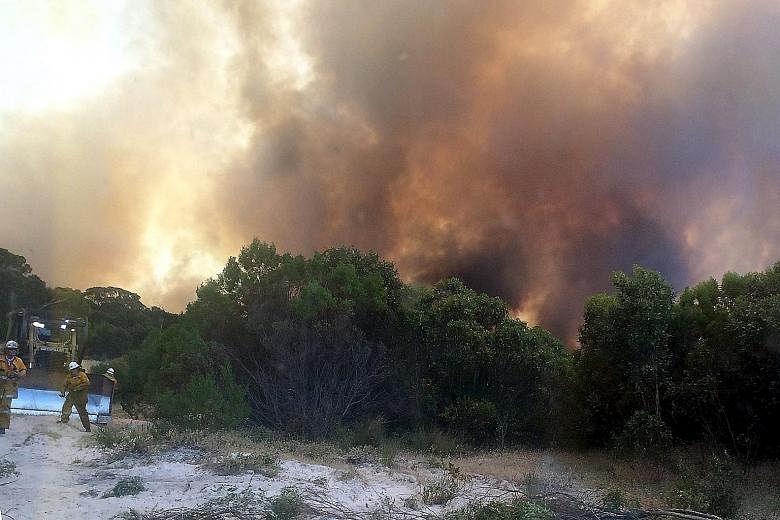Australia has experienced two deadly bush fires in the past two weeks in an ominous sign that has prompted calls for urgent action such as improving weather predictions or adding more firefighters.
As the nation prepares for a summer that is expected to be one of its hottest on record, experts have warned that dangerous out-of-control fires are becoming more intense, more frequent and are occurring earlier each year.
There have been calls to double the number of firefighters over the next two decades and to stop relying on leasing equipment from other countries, which will need it for their own worsening disasters.
An expert on fire management at Melbourne University, Professor Kevin Tolhurst, said Australia was "one of the best prepared nations in the world for fires - but that is still pretty poor". "We are still way underdone," he told The Straits Times. "We are not adequately prepared for the big fires."
The warning came as hundreds of firefighters were battling to contain a fast-moving fire in South Australia yesterday which killed two people and left 13 injured.
The blaze north of Adelaide began on Wednesday and has destroyed at least 16 homes and 85,000ha of bush land, along with 2,000 pigs and up to 150,000 chickens.
Urging residents to avoid the affected areas, South Australia's State Premier Jay Weatherill said: "We understand many people are anxious to return home but we cannot compromise your safety."
The fire is expected to take several days to contain and is not believed to have been deliberately lit.
The devastating blaze in South Australia came less than two weeks after a fire north of the town of Esperance in Western Australia left four people dead, including tourists from Britain, Norway and Germany.
The two fires - which came weeks before the official start of summer - followed surprisingly early outbreaks of bush fires this year in Tasmania and New South Wales.
The average bush fire season has grown in length across the globe as weather patterns have changed, with a study this year by US researchers finding an 18.7 per cent increase between 1979 and 2013.
The latest predictions have indicated that the warming of the planet is not letting up.
The World Meteorological Organisation said this week that global warming and the El Nino weather pattern meant the world was facing the hottest year on record in 2015, beating the record set last year.
Australia's weather agency, the Bureau of Meteorology, said yesterday that Australia would record its sixth hottest year in 2015, but the hottest remained 2013.
The grim news has led to experts in Australia calling for urgent action to prevent further devastation.
Fires claim an average of five lives a year in Australia - though the rate has grown in recent years - and leave an annual toll of A$337 million (S$473.5 million).
A report released last week by The Climate Council, a non-governmental organisation, called for Australia to roughly double the number of professional firefighters over the next 15 years, from 11,000 in 2010 to about 22,000 by 2030.
It noted that Australia and the United States had long shared firefighting resources, such as equipment and aircraft, because their summers occur at opposite times of the year. But such sharing - including Australia's leasing of specialist air tankers - the report warned will no longer be possible as the length of the fire season in both nations continues to extend.
"Firefighting services will be less able to rely on help from interstate and across the world as fires occur simultaneously," it said. "This is a major challenge for Australia... Longer, hotter and more intense heatwaves, and more frequent and severe droughts, are driving up the likelihood of very high bush fire risk, particularly in the south-west and south-east of Australia."
Prof Tolhurst said he did not believe adding firefighters was a priority, saying the authorities have been too quick to extinguish naturally occurring fires rather than let them safely burn. Such fires can help to thin out bush land and burn dead leaves and twigs that fuel dangerous fast-moving fires.
He said the authorities in Australia also need to try to improve urban planning and prevent increases of populations in dangerous areas.
"We shouldn't put people in fire-prone areas and set them up for a lot of loss of property and life," he said. "The bush is a pleasant environment until a bush fire comes along."


